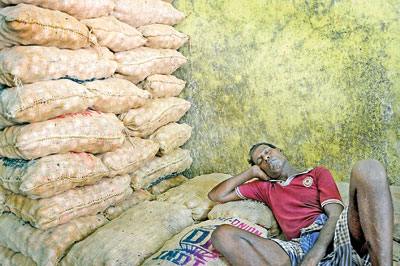News
Commodity traders bemoan sales slump
With the Avurudu season in the offing and the tabling of the budget in Parliament not too far away, traders continue to lament over a future which seems bleak to them.
Traders who were once busy counting stashes of cash now sit inside their shops wearing grief-stricken expressions.

Heaps of unsold potatoes tell his story. Pix by Ishanka Sunimal
Sales have dwindled drastically for Sri Yogeswaran, 47, a wholesale trader who sells onions and potatoes. A thin stack of bills on his desk serve as a testimony to the drop in sales.
He says the budget must remove the Rs 50 tax on imported potatoes.
“We face direct losses since a kilogram of potatoes which is purchased for Rs 55 is sold at around Rs 48,” he laments while pointing to heaps of unsold potatoes.
However, S. Selvadurai, 60, says that it is the recent political crisis and the impact of natural disasters that have taken a toll on the peoples’ lives and has subsequently led to a drop in sales.
“Earlier, we used to import about four containers of goods for a month. Now it is difficult to even sell one container of goods,” he laments.
Earlier this month, Minister of Agriculture, P. Harrison, announced that a ceiling price would be imposed on the prices of rice from April 01.
This has not satisfied traders like S. Sivakumar, 58, who run wholesale rice outlets.
Sivakumar tells us that he has not been able to earn a considerable profit since the price of rice has dropped due to an abundant harvest.
“A kilo of Nadu rice which stood at around Rs 100 last year sells at around Rs 90 today while Samba which stood at Rs 120 has dropped to Rs 95,” Sivakumar says while showing us a few samples of rice on his desk.
As we traverse the streets of Pettah, labourers sit on the sidewalk sipping thambilli (king coconut) to quench their thirst. Some others however, doze off due to the lack of work.
V. Kandaiyyah, 70, works as an assistant labourer at a shop which imports onions and potatoes. He was employed as a driver for 50 years and now assists in unloading goods from trucks.
“Last year I received Rs 2000 as my daily wage, but now I receive only Rs 1,500,” he laments adding that the drop in sales has had an indirect impact on his living.
Mohamed Irfan, 43, who runs a textile shop, is also not hopeful of a rise in sales during the festive season.
“My sales have already dropped by 60-70 percent from last year,” he said adding that the Avurudu season was not going to necessarily spell a rise in sales.
A wholesale pulses importer who did not wish to be identified said that her business had suffered heavy losses since customers offer them cheques which are returned by the bank.
“The rising cost of living faced by the people have forced them to engage in such malpractices,” she said adding that court cases filed against such individuals have been postponed for over five years.
She said that the Avurudu season was not going to make a difference to her business.
“Earlier, we used to import around 25 metric tons of pulses in 25 containers a month. However, now it is extremely difficult to sell even two containers of goods per month,” the trader complained.
However, some importers claim that business is not as bad as it seems to be although there is a slight decrease in customers.
“A sharp decline in sales cannot be observed these days because people purchase goods for consumption despite the high prices,” G. Rajendran, President of the Essential Food Commodities Importers Association told the Sunday Times.
He points out that dhal is the biggest import, with some 12,000 metric tonnes being imported in 4,400 containers every month.
Against this backdrop, economists say that traders have to contend with the lack of demand.
“This will be resolved since commercial banks now have the facility to provide more loans to the people,” the president of the Sri Lanka Economic Association, Dr. Upananda Vidanapathirana said.
He pointed out that this is a result of the steps taken to reduce the minimum deposit amount that should be maintained by Commercial Banks at the Central Bank.
With the second reading of the budget due this Tuesday, consumer rights protection groups are calling for their demands to be heard.
“The government must impose a maximum retail price on essential food items at least during the next two months for the Avurudu season” Ranjith Vithanage, the chairman of the National Movement for Consumer Rights Protection, said.
Meanwhile, Trade and Commerce Minster, Rishad Bathiudeen, told the Sunday Times that the government is planning to impose ceiling prices on more essential goods.
The Cabinet cost of living sub-committee which met this week had discussed this issue.
First, he said, the consumer affairs authority would identify the items on which a maximum retail price should be imposed.

